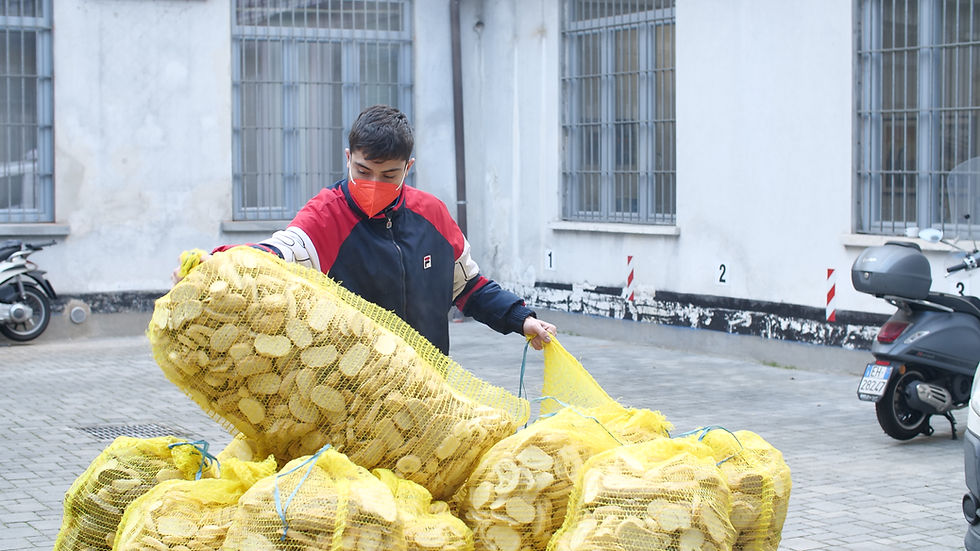Food Rescue and Retail: how supermarkets can be part of the solution
- Biova Project

- Mar 18, 2025
- 4 min read
Updated: Mar 31, 2025

Every year, supermarkets generate millions of tons of food waste, much of which is still edible. From surplus baked goods to unsold fresh produce, the retail sector plays a crucial role in either contributing to or reducing food waste. While many retailers have implemented waste reduction policies, food rescue and upcycling present an even greater opportunity - not just to minimize waste, but to create real economic and environmental value.
At Biova Project, we believe that large retailers (GDO - Grande Distribuzione Organizzata) can become key players in a circular food system, where surplus food is not discarded but repurposed into new, high-quality products. And we’re already making it happen.
The Role of Supermarkets in Food Waste Management
Supermarkets are at the heart of the food supply chain, connecting producers, distributors, and consumers. However, they also face significant challenges in managing surplus food efficiently.
Waste occurs in multiple ways:
Overstocking & Shelf Life Limits To meet demand, many retailers overstock perishable goods, leading to excess inventory and inevitable waste.
Aesthetic & Packaging Issues Products that don’t meet visual standards (e.g., oddly shaped bread, slightly damaged packaging) are often discarded despite being perfectly edible.
Short-Dated Products Items nearing their sell-by date are frequently removed from shelves and often end up as waste.
Traditional solutions include discounting near-expiry products, donating to charities, or sending food to animal feed or biogas production. However, these methods only partially recover the value of the food. Upcycling, on the other hand, offers a smarter, more sustainable alternative - keeping food within the human food chain while generating new economic opportunities.
Supermarkets leading the way in upcycling
Forward-thinking retailers are already partnering with upcycling startups to repurpose their food surplus.
Examples of successful collaborations:
• Tesco (UK) Works with food rescue initiatives to turn surplus baked goods into new snacks and ingredients.
• Lidl (Germany) Partners with upcycling companies to transform unsold bread into craft beer and other value-added products.
• Carrefour (France) Implements a food rescue program, converting unsold fruits and vegetables into juices and preserves.

These initiatives demonstrate that supermarkets don’t just have to “reduce waste” - they can actively participate in creating circular food products.
How Biova helps supermarkets rescue food
At Biova Project, we have already built successful partnerships with major retailers to rescue surplus bread and transform it into upcycled products.
We recover bread from Carrefour, Coop, and Aldi, preventing waste and repurposing it into high-quality beer, snacks, and flour.
We have launched co-branded labels with these supermarkets, celebrating our partnerships and their commitment to food rescue.
Through these initiatives, supermarkets can actively showcase their sustainability efforts, making the impact visible to their customers.
Here’s how supermarkets can integrate upcycling into their waste reduction strategies:
Bread Upcycling into Beer & Snacks Supermarkets often have excess bread that goes unsold. Biova collects this surplus and transforms it into craft beer, snacks (Ri-Snack), and upcycled flour (BIO Flour). This prevents waste while creating high-value, marketable products.
Food Waste Data Optimization By tracking which products are frequently wasted, supermarkets can collaborate with upcycling companies to create tailored recovery strategies. For example, excess croissants or pastries could be transformed into new baked goods instead of being discarded.
Private Label Upcycled Products Retailers can launch co-branded upcycled food products, turning waste into exclusive supermarket offerings. Imagine a supermarket-branded beer made from its own unsold bread!
Consumer Education & Awareness Supermarkets can leverage storytelling and transparency to educate consumers about food rescue, showcasing how their purchasing choices directly support waste reduction.
The environmental impact of supermarkets embracing upcycling
The food industry is responsible for one-third of global greenhouse gas emissions, and food waste accounts for 10% of total emissions.
Every kilogram of bread wasted generates: 1.2 kg of CO₂ emissions 1,600 liters of water usage 0.5 m² of farmland consumption
Thanks to our partnerships with supermarkets, Biova has already recovered over 16 tons of bread, preventing:
8 tons of CO₂ emissions
25 million liters of water from being wasted
The equivalent of removing 1,739 cars from the road for a year

By upcycling surplus bread instead of discarding it, supermarkets can drastically cut their carbon footprint while engaging consumers in the sustainability movement.
The future of retail is circular
Supermarkets are more than just food retailers - they are key players in shaping the future of food sustainability.
By embracing food rescue and upcycling, they can: Reduce food waste and environmental impact Create new revenue streams from surplus food Strengthen their brand image as sustainability leaders Offer customers innovative, eco-friendly products
At Biova Project, we have proven that upcycling partnerships with supermarkets work. Carrefour, Coop, and Aldi have already joined us in the fight against food waste, turning their surplus bread into tangible, marketable, and sustainable products.
Supermarkets that embrace upcycling will not only reduce their footprint - they will set a new industry standard for sustainability.
It’s time to move from waste management to resource innovation. Will your supermarket be part of the change?




















Comments